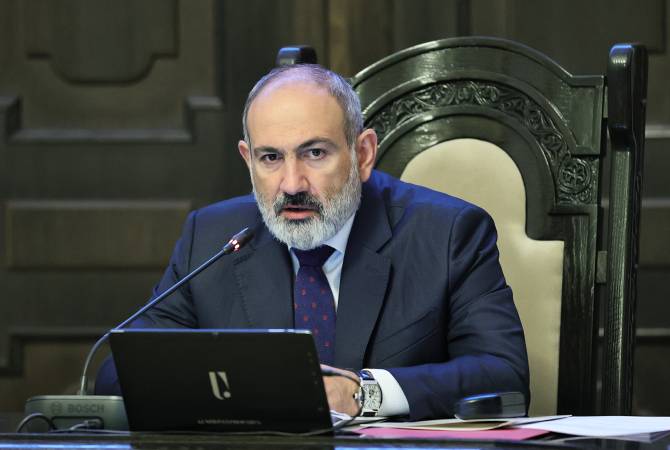 11:26, 28 September 2023
11:26, 28 September 2023
YEREVAN, SEPTEMBER 28, ARMENPRESS. Analysis shows that no Armenian will be left in Nagorno-Karabakh in the coming days, Prime Minister Nikol Pashinyan warned Thursday.
“The exodus of Armenians from Nagorno-Karabakh continues as a result of the policy of ethnic cleansing carried out by Azerbaijan. Analysis shows that no Armenian will be left in NK in the coming days. This is a direct act of ethnic cleansing and [dispossession], and what we’ve been warning about the international community for a long time. The statements made by various international actors condemning ongoing ethnic cleansings in NK are important, but if no concrete actions follow these statements will be viewed only for creating a moral statistics for history,” PM Pashinyan said.
He warned that various countries, by simply making statements and not taking action, are trying to have an opportunity to separate themselves from this crime, in order to then be able to say ‘well, we had condemned it.’
“If no relevant political and legal decisions follow the statements on condemning it, the condemnations become acts of giving consent to what’s happening. Regarding the Government of Armenia, our primary duty today is to receive our brothers and sisters forcibly displaced from NK with the utmost care and ensure their urgent needs are met,” Pashinyan said.

Azerbaijan and “brother ally” Turkey turned up the heat on embattled Armenia on September 25, hinting that they may be set to push hard for Yerevan to agree to a land bridge across Armenian territory that would link their two countries.
As Armenia struggled to deal with the mass exodus of ethnic-Armenians fleeing the Nagorno-Karabakh enclave in the wake of last week’s decisive one-day military offensive conducted by Azerbaijan, Turkey’s President Recep Tayyip Erdogan pointedly met Azerbaijani counterpart Ilham Aliyev for the opening of a newly modernised military installation in Azerbaijan’s Nakhchivan exclave—the territory holds great importance in that Baku wants to carve a land corridor across Armenia from the main part of Azerbaijan to Nakhchivan, which borders Turkey.
Azerbaijan and Turkey—which often refer to their two countries as “two states, one nation”—insist Armenia promised to accept such a corridor in the Russian-brokered ceasefire talks that ended the 44-day Second Nagorno-Karabakh War in late 2020, something that Yerevan denies.
At a joint news conference following their meeting, at which neither strongman took any questions, Aliyev lamented how Soviet-era authorities had decided that, part of what he said should have been territory belonging to the Azerbaijani Soviet republic, was land belonging to the Armenian Soviet republic.
“The land link between the main part of Azerbaijan and Nakhchivan was thus cut off,” complained Aliyev, as reported by Reuters.
The corridor, if built, would stretch across Armenia’s southern Syunik province. Both Azerbaijan and Nato member Turkey refer to it as the Zangezur Corridor.
Addressing the UN General Assembly in New York on September 19, the very day Azerbaijan invaded ethnic-Armenian-controlled Karabakh, Erdogan referred to the desired land link, saying: “We expect a comprehensive peace agreement between the two countries [Azerbaijan and Armenia] as soon as possible and for promises to be quickly fulfilled, especially on the opening of the Zangezur corridor.”
Aliyev has since the last Karabakh war occasionally become rather bellicose about his demand for the corridor. In 2021, he threatened to create it “whether Armenia likes it or not”.
However, a big difficulty for Aliyev is that Nakhchivan and Syunik both border Iran and any land bridge would necessarily run parallel to the Armenian-Iranian border. Tehran has made it clear that it is staunchly opposed to any developments near its border that could interfere with its trade routes via Syunik and is clearly also greatly concerned that such a corridor would extend Turkey’s geopolitical heft across both the South Caucasus and Central Asia, which borders Azerbaijan. There were fresh reports this week in the Iranian media of Tehran beefing up its military deployments near Iran’s borders with Armenia and Azerbaijan.
Russia’s current stance on whether the corridor should be permitted by Armenia is not clear, but Moscow is engaged in an increasingly bitter spat with Armenia over Yerevan’s accusation that Russia has not lived up to its security commitments as Armenia’s strategic partner and the Armenian government’s newly expressed willingness to strengthen ties with the West.
Speaking after his meeting with Erdogan in Nakhchivan, where the pair also attended a gas pipeline groundbreaking ceremony, Aliyev—as reported by Turkish state-run news service Anadolu Agency—said: “[Azerbaijan and Turkey] want peace and stability in the region, not war”.
The meeting, however, has clearly sown plenty of anxiety.
Thomas de Waal, a senior fellow at think tank Carnegie Europe who specialises in Eastern Europe and the Caucasus, wrote on his X platform microblog that Azerbaijan and Turkey could present an ultimatum to Armenia over the corridor, saying: “Days after Azerbaijan’s military takeover of Karabakh, Presidents Aliyev and Erdogan meet in Nakhchivan today and will very likely make ultimatums to the Armenian government to ‘open the Zangezur Corridor or else…’
“Can we be really going the world of 1918-21 when big powers try to use force to draw and redraw the map of the Caucasus? Let it not be so.”
IE 11 is not supported. For an optimal experience visit our site on another browser.
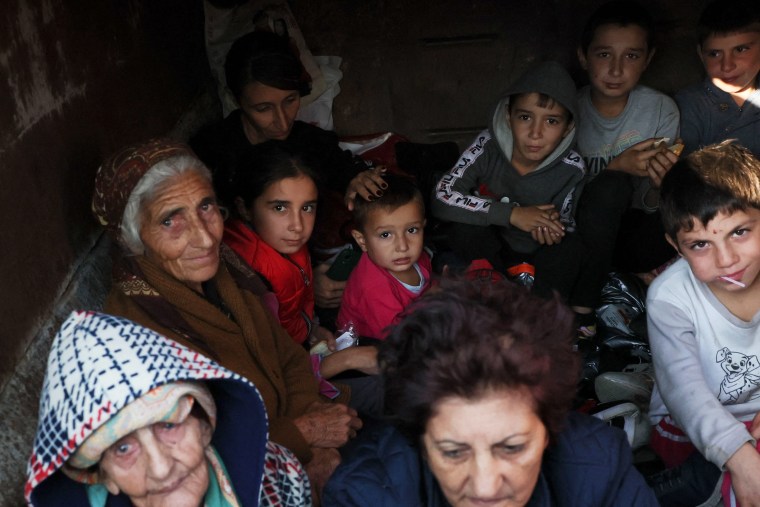
Refugees sit in the back of a truck near Kornidzor, Armenia, on Thursday. Alain Jocard / AFP – Getty Images
After more than half the population of an ethnic Armenian enclave fled their homes in a mountainous pocket of land south of Russia, the breakaway republic’s leaders said it would soon “cease to exist.”
In what amounted to a formal capitulation to Azerbaijan, which surrounds it, the Armenian leaders of Nagorno-Karabakh said the self-declared Republic of Artsakh would be dismantled by the end of the year.
This would end three decades of intermittent conflict in and around the enclave, break a 10-month blockade of the region in the South Caucasus that residents said had starved them into submission, and dash hopes of an independent state in territory claimed by Azerbaijan.
The dissolution of Nagorno-Karabakh as a breakaway state is a seminal point — a rare supernova among the constellation of ethnic conflicts left by the implosion of the then-Soviet Union in the early 1990s. The conflict’s abrupt halt reflects how the geopolitical reach of Russia’s invasion of Ukraine has forced realignments far beyond that war.
In an official decree, the region’s separatist President Samvel Shakhramanyan said that residents of Nagorno-Karabakh must now “familiarize themselves with the conditions of reintegration” into Azerbaijan and make “an independent and individual decision about the possibility of staying (or returning) in Nagorno-Karabakh.”
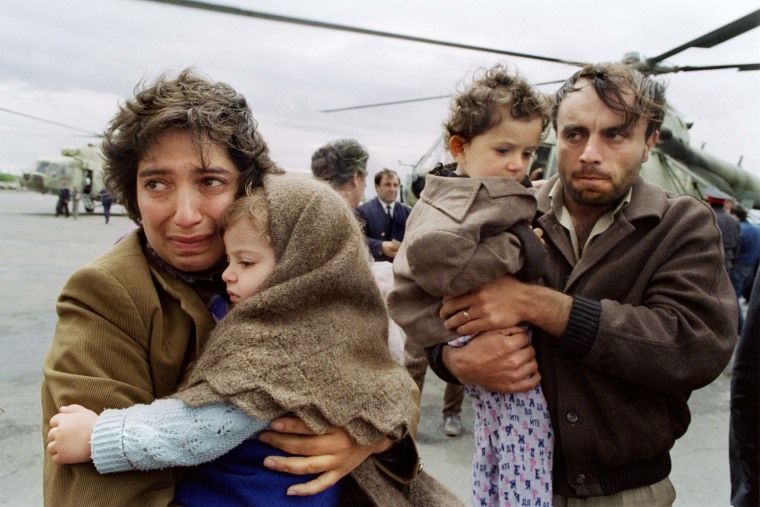 An Armenian family fleeing Nagorno-Karabakh arrives at Yerevan airport in 1991 after being evacuated by a Soviet army helicopter.Wojtek Druszcz / AFP via Getty Images
An Armenian family fleeing Nagorno-Karabakh arrives at Yerevan airport in 1991 after being evacuated by a Soviet army helicopter.Wojtek Druszcz / AFP via Getty ImagesThe announcement came as around 70,000 of the enclave’s population of about 120,000 fled from the region, which sits within Azerbaijan’s borders, to neighboring Armenia, according to Armenia’s government, with more still arriving.
Many residents hauled what few personal belongings they could gather into packed cars, trucks, buses and tractors, some pockmarked with shrapnel after days of Azerbaijani attacks.
Armenia’s leadership has accused Azerbaijan of instigating a refugee crisis by launching a swift invasion this week. Azerbaijan has denied allegations of “ethnic cleansing,” saying it is not forcing people to leave, and would peacefully reintegrate the region and guarantee rights of ethnic Armenians.
Holding a wealth of monasteries, mosques and other religious sites, Nagorno-Karabakh is culturally significant for both Muslim Azeris and what was an overwhelming Christian Armenian population. Armenians in Azerbaijan have been victims of pogroms, while Azerbaijanis claim discrimination and violence at the hands of Armenians.
“Azerbaijan has won a comprehensive military victory and what we’re looking at now is the prospect of Nagorno-Karabakh without Armenians or with very few Armenians remaining,” said Thomas de Waal, a senior fellow with the London-based Carnegie Europe think tank. “So in that sense, Azerbaijan has won.”
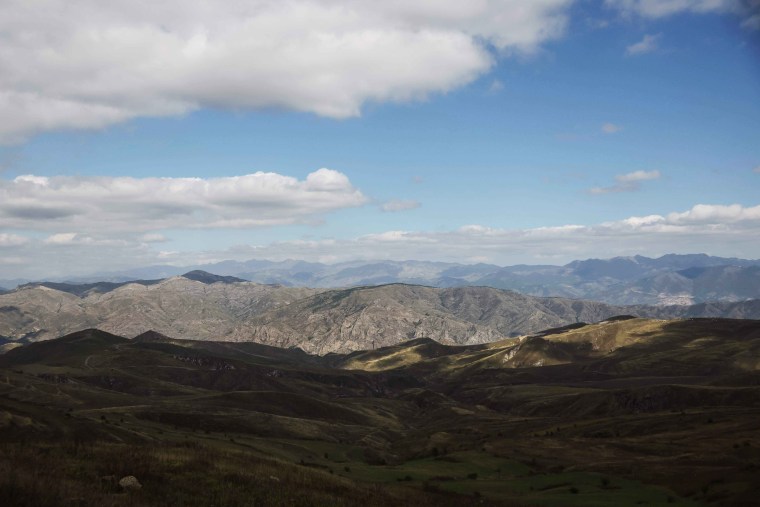 The Karabakh Mountains, seen from the Armenian side of the border with Azerbaijan on Wednesday.Alain Jocard / AFP – Getty Images
The Karabakh Mountains, seen from the Armenian side of the border with Azerbaijan on Wednesday.Alain Jocard / AFP – Getty ImagesFor those fleeing, the despair of losing their homes was made worse by losing their homeland.
“Many of them are from villages which were taken by the Azerbaijani army, so they really lost their homes already,” said Astrig Agopian, a French Armenian journalist who has been reporting this week on the refugee crisis from Armenia’s border. “There is really this feeling that this time is different. It’s another war, but it’s a war that is definitely lost this time.”
Were that the case, it would bring to an end decades of violence in the region, which has been at the center of geopolitical interests between Eastern and Western nations for centuries.
The political dispute between Armenia and Azerbaijan over Nagorno-Karabakh began as the then-Soviet Union weakened in the late 1980s, and Armenians demanded that the majority-Armenian region be incorporated into the Armenian Soviet Socialist Republic.
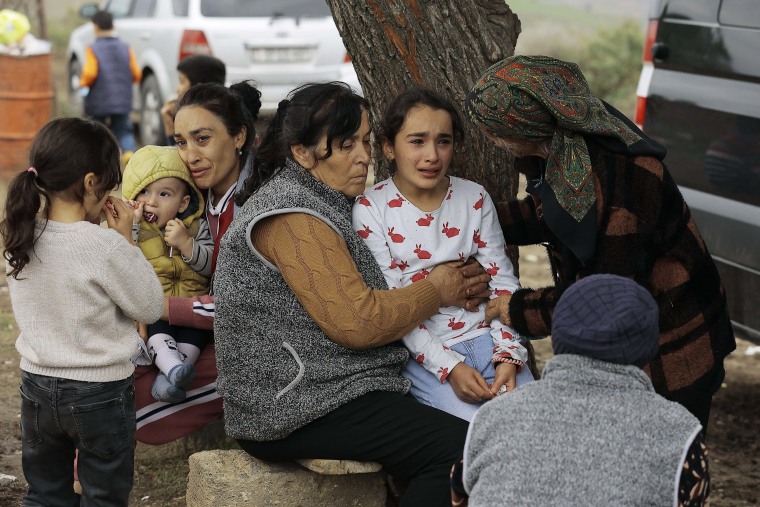 Ethnic Armenians from Nagorno-Karabakh comfort a young woman upon arriving in Kornidzor, Armenia, on Tuesday. Vasily Krestyaninov / AP
Ethnic Armenians from Nagorno-Karabakh comfort a young woman upon arriving in Kornidzor, Armenia, on Tuesday. Vasily Krestyaninov / APAfter the USSR collapsed in 1991, the conflict erupted into a full-scale war that persisted until a Russian-brokered peace deal in 1994. About 30,000 people were killed and more than a million people displaced.
“My husband died in the first war. He was 30, I was 26. Our children were 3 and 4 years old. It is the fourth war that I went through,” Narine Shakaryan, a grandmother of four, told the Reuters news agency after she arrived in Armenia. “My husband died back then, he was 30 in 1994. That’s the cursed life that we live.”
The fighting continued intermittently for several more decades, leaving an indelible mark on generations of Nagorno-Karabakh’s ethnic Armenian residents. A recent war in 2020 saw the more powerful Azerbaijan, backed by Turkey, reclaim much of the land surrounding the area, as well as part of the region itself.
Russia negotiated an end to that flare-up and even deployed peacekeepers to ensure security along the Lachin Corridor, the single mountain road that connected Armenia to Nagorno-Karabakh.
But the events of the past year show how Moscow, which has historically played the role of both peacekeeper and ally to Armenia — which shares its Christian roots and hosts a Russian military base — has adjusted its allegiances following its invasion of Ukraine and its conflicts with the West.
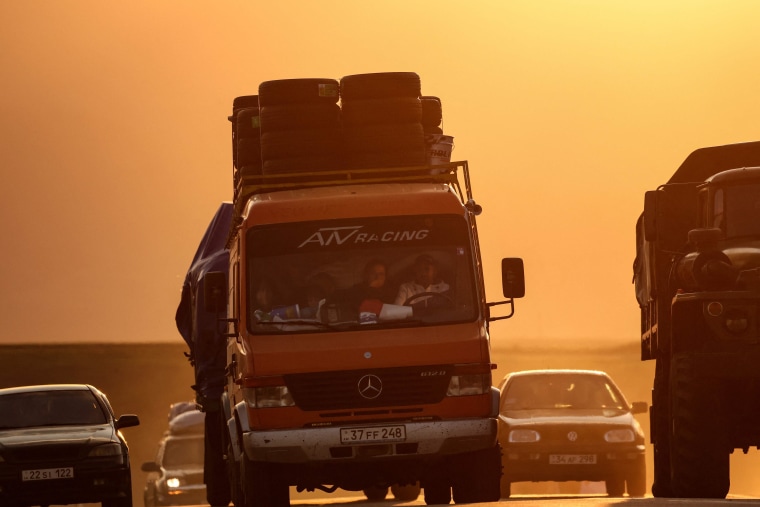 Refugees crossing the border near Kornidzor, Armenia, on Wednesday.Alain Jocard / AFP – Getty Images
Refugees crossing the border near Kornidzor, Armenia, on Wednesday.Alain Jocard / AFP – Getty Images“The pivotal factor was that Azerbaijan was talking separately to the Russians, and had a joint agenda with the Russians, to pressure Armenia and also to keep the West out of the Caucasus,” de Waal said. “This is why when the Azerbaijani assault happened, Russian peacekeepers who could have actually stopped it stood down. And then Russia failed to condemn the attack.”
After its invasion of Ukraine left Russia isolated, Moscow may feel it has more to gain from cozying up to Azerbaijan than Armenia, particularly after the latter made a public display of cozying up to the West and provided humanitarian aid to Kyiv.
Earlier this month, the country conducted joint exercises with the U.S. military and the Armenian Parliament is set to vote next week on whether to accede to the International Criminal Court, which classifies Russian President Vladimir Putin as a war criminal — a move the Kremlin characterized Thursday as “extremely hostile.”
Inside Nagorno-Karabakh, Azerbaijan’s government has assured the region’s Armenian population that they will be treated humanely and afforded equal rights.
But after months of blockades and blistering fighting, few ethnic Armenians believe it and many feel they have no choice but to flee.
“When Rabbis Bless Congress: The Great American Story of Jewish Prayers on Capitol Hill” … buy the new book here:
https://www.whenrabbisblesscongress.com
https://www.amazon.com/When-Rabbis-Bless-Congress-American/dp/1644693445/
Sen. BOB MENENDEZ 12-16-2020
“Indeed, adopting ad hoc changes
rather than looking at more comprehensive reform could actually create more problems down the road.
Many have noted that FARA’s definitions and requirements are broad and
sow confusion over exactly when and
under what circumstances an individual must register and report covered
activities. There is no denying the nature of lobbying, influence efforts, and
communication methods have dramatically changed since FARA was enacted
in 1938 or even revised in 1966.
We live in a dramatically more interconnected and complex world today.
Foreign influence efforts and
disinformation have made their way
into the top echelons of U.S. Government and this very body. It seems only
prudent that we step back and examine
whether there are blind spots in the
current FARA regime. “

The post No Armenian will be left in Nagorno-Karabakh in coming days amid exodus – Pashinyan on Azeri ethnic cleansing campaign first appeared on The News And Times – thenewsandtimes.com.
